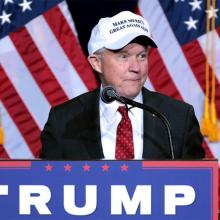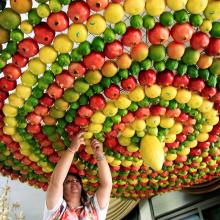Israelites
MARCH IS MY favorite month of the year and not simply because of the renewal of spring. As a college basketball fanatic, it is also because of the NCAA men’s tournament, otherwise known as March Madness. My passion for college hoops began when I moved to Tucson before my junior year of high school and started attending every home game at the University of Arizona, where college basketball is an obsession. In light of the hardship and devastation that this pandemic has inflicted, it feels overdramatic to say that my spirits were crushed last March when the NCAA made the necessary decision to pull the plug on the March Madness tournament. This year, the NCAA plans to host the tournament in a bubble, following the model of last summer’s NBA playoffs. The tournament will feel incomplete without screaming fans, but the fact that it will take place at all offers a signal that the beginning of the end of the pandemic is within sight.
As our nation moves out of a long, dark winter of COVID-19 infections, hospitalizations, and deaths, we can all use a dose of something to look forward to, even if those somethings don’t look identical to life before the pandemic. A bubbled March Madness feels like a fitting metaphor to the critically important space we will be in as vaccines help us turn the tide against this virus and toward a new normal. But the journey between the spring and fall will likely feel like a long and tortuous one, particularly if COVID-19 fatigue devolves into resentment, resignation, or at worst nihilism. With the advent of more contagious and possibly more deadly strains of the virus, social distancing and mask-wearing will be even more necessary to transition from the wilderness of the current pandemic into the promised land of a post-COVID-19 world.
Sessions has long been, in the words of one prominent immigration advocate, the “most anti-immigrant senator in the chamber.” When George W. Bush, a self-styled “compassionate conservative” and born-again Christian, pushed a comprehensive immigration reform bill in 2007 that was supported by many business and law-enforcement officials, Sessions railed against what he called the “no illegal alien left behind bill” and led the charge against the failed effort. “Good fences make good neighbors,” he said at a press conference the year before.
Late October is a time of colorful festivals around the world. Some mark the harvest, others are festivals of lights. Now, and in the coming weeks, Hindus, Jews, Buddhists, and Yoruba are celebrating different holidays, explained here and shown in the photo essay below.
After winning the Triple Crown, American Pharoah’s jockey, Victor Espinoza, showed that he doesn’t live in fear of losing his power. And, as opposed to the Egyptian Pharaoh, he showed he has a soft heart for those who are suffering.
Espinoza reportedly earned $80,000 for his victory at the Belmont Stakes and he’s giving it all away. “I won the Triple Crown right now,” he stated, “but I don’t make any money because I’m donating all the money to the City of Hope.” The City of Hope is a cancer research and treatment center. Espinoza also donates his time at the City of Hope, visiting with children struck by cancer. He says, “The kids [are] 6 years old, 10 years old, it’s just heartbreaking.” Why does he do it? “I just saw one kid with the disease and that’s how I changed my life. I changed the way I think. Pretty much I changed everything … the first change I made was in my heart.”
AN ASTONISHING aspect of the miracle that was the Exodus is the recorded “600,000 men on foot, not counting their dependents” (Exodus 12:37). A whole people uprooted themselves and moved into the unknown. This was displacement on a massive scale. Their readiness to move from the security of slavery, from the only reality they had known for four-and-a half generations, was more awesome than the willingness of Pharaoh to let them leave.
What organizer today would not grasp at the key to a process that would move enslaved people in the Egypts of today? ... But this is still the beginning. The 40 years of wandering in the wilderness may have been a punishment for their constant complaining.
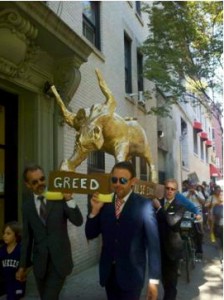 Editor’s Note: In light of the recent protests at #OccupyWallStreet and around the world, we have revisited Jim Wallis’ 2010 book Rediscovering Values: On Wall Street, Main Street, and Your Street and picked out some passages that are particularly pertinent to what we are seeing in our nation today.
Editor’s Note: In light of the recent protests at #OccupyWallStreet and around the world, we have revisited Jim Wallis’ 2010 book Rediscovering Values: On Wall Street, Main Street, and Your Street and picked out some passages that are particularly pertinent to what we are seeing in our nation today.
The Passover of the Jews was near, and Jesus went up to Jerusalem. In the temple he found people selling cattle, sheep, and doves, and the money changers seated at their tables. Making a whip of cords, he drove all of them out of the temple, both the sheep and the cattle. He also poured out the coins of the money changers and overturned their tables. He told those who were selling the doves, “Take these things out of here! Stop making my Father’s house a marketplace!” His disciples remembered that it was written, “Zeal for your house will consume me.”
– John 2:13-17
Interestingly, in his turning over of tables, Jesus specifically targeted the merchants who were selling doves. Doves were the least expensive sacrifice permitted to be offered in the temple, and, therefore, were often bought by the poorest of the pilgrims.
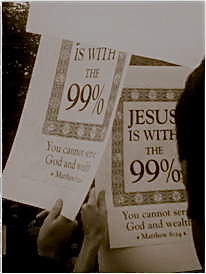
[When Jesus turns over the tables] we see a man enraged at injustice and passionately confronting those who exploit the poor. We also learn that there are some things that we all should get angry about, that there are situations where the only appropriate response is confrontation…
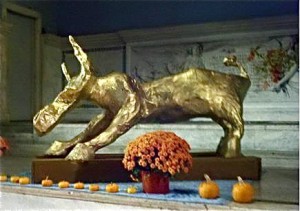 First, we were sold a lie. We were sold an illusion that promised the American Dream was as close as our next purchase. That we could pursue our selfish interests without thought to the consequences, because the “invisible hand” would work it all out in the end. We were told that we did not need to work for wealth, that it would come if only we put our money in the hands of the right stock broker, mutual fund, or stock…
First, we were sold a lie. We were sold an illusion that promised the American Dream was as close as our next purchase. That we could pursue our selfish interests without thought to the consequences, because the “invisible hand” would work it all out in the end. We were told that we did not need to work for wealth, that it would come if only we put our money in the hands of the right stock broker, mutual fund, or stock…
Second, the rules of the game failed. It was supposed to be simple. Work hard, get ahead, buy a home, and tuck some money away for the future in a 401(k). If you followed those rules, everything would work in your favor. But good jobs have disappeared, wages have been garnished, and 401(k) savings have disappeared. The rules of the game seem to have worked for those who set the rules, but not for those who played by them.
Third, our good was supposed to trickle down. We were promised that as the rich got richer, the rest of the country would prosper as well. If we handed our finances and ultimately our lives over to those who knew the market the best, it would benefit us all. If we took the virtues of the market and made them the virtues of our lives, we, too, would experience boundless prosperity. Fulfillment would come if we could just trust the market enough to work for us…
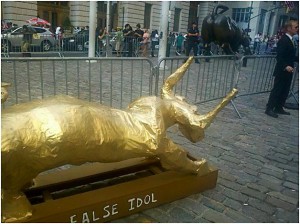 The market has become our “golden calf,” our idol of ultimate allegiance… This is when God—and then Moses—got angry. Why? Just because they built a golden calf? No. The calf could have been just a work of art, a statue to enjoy. What made the calf an idol was that the people gave the newly created calf the credit for leading them out of Egypt. They gave to the golden calf credit and attributes that belong only to God…
The market has become our “golden calf,” our idol of ultimate allegiance… This is when God—and then Moses—got angry. Why? Just because they built a golden calf? No. The calf could have been just a work of art, a statue to enjoy. What made the calf an idol was that the people gave the newly created calf the credit for leading them out of Egypt. They gave to the golden calf credit and attributes that belong only to God…
Today, instead of statues, we have hedge funds, mortgage- backed securities, 401(k)s, and mutual funds. We place blind faith in the hope that the stock indexes will just keep rising and real estate prices keep climbing. Market mechanisms were supposed to distribute risk so well that those who were reckless would never see the consequences of their actions. Trust, security, and hope in the future were all as close to us as the nearest financial planner’s office. Life and the world around us could all be explained with just the right market lens. These idols were supposed to make us happy and secure and provide for all our needs. Those who manage them became the leaders to whom we looked, not just for financial leadership, but direction for our entire lives. That is idolatry.
Rich and poor alike were sucked into making heroes out of those who seemed to be able to turn everything they touched into gold. Holocaust survivor and Nobel Peace Prize recipient Elie Wiesel lost virtually all of his personal wealth and his foundation’s, up to $37 million, to Bernie Madoffs Ponzi scheme. “We gave him everything, we thought he was God, we trusted everything in his hands.”‘
(All pictures are courtesy of Catholics United, who produced the ‘golden calf’. Extracts come from pages 19-29 of the hardcover edition of Rediscovering Values.)
This Sunday is Pentecost. For 50 days, a group of 120 followers of Jesus waited. Their teacher, for whom they had left all they had, was now gone. Judas, one of their own, betrayed their master and then killed himself. The comforter they had been promised had not yet come.

